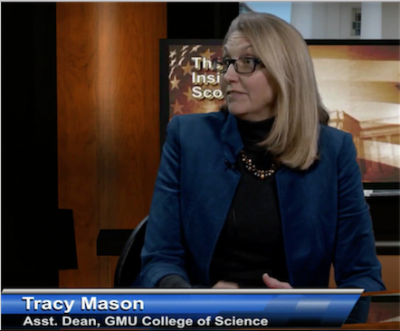The Dyslexic Edge Conference on Inside Scoop
(February 4, 2019) Catherine Read speaks about the upcoming Dyslexic Edge Conference with Kristin Gauthier of Sliding Doors, Tracy Mason, Assistant Dean at George Mason University College of Science and Shannon Duncan of Decoding Dyslexia Virginia. In addition to discussing the upcoming conference, they talk about information regarding dyslexia advocacy in the Virginia General Assembly.
In the first segment, Catherine interviews Kristin Gauthier, founder and director of Sliding Doors, a STEM and dyslexia learning center. Her organization aims at helping students who have dyslexia, and includes a formal 2-year instruction program coupled with STEM focused enrichment. Students with dyslexia are shown to have a natural talent in STEM related fields. Therefore, one of Gauthier’s goals is to promote this amongst students, families and STEM professionals. Gauthier has been instrumental in getting the Dyslexic Edge Conference off the ground, and is working to get the word out into the community. She emphasizes that their philosophy is to focus on nurturing strengths in students with dyslexia, as opposed to looking at their challenges, and to use that as a launching pad for future endeavors.
The conference is geared toward three audiences: children and their families, teachers and STEM professionals.The day will be divided into two parts, the morning programming will consist of speakers for teachers and parents, while the afternoon will be hands-on learning workshops for students and families.
Dyslexia is said to affect 1 in 5 students nationwide. Gauthier shares that early detection is key, in order to ensure that children do not fall far behind their peers. If a child is identified during kindergarten in the early stages of learning to read, then they would need approximately 30 minutes of daily intervention to stay on track. If that same child is diagnosed in third grade, the needed intervention time jumps to a whopping 3 hours a day. A conference goal is to raise awareness so that teachers can recognize warning signs and red flags, ensure that children are properly screened, and provide teachers with resources that they can use in their curriculum.
In the second segment Catherine speaks with Tracy Mason, the Assistant Dean for the College of Sciences at George Mason University. She is thrilled that the University is hosting this conference as a collaborative effort between the Colleges of Science and Education. Her desire is to promote education that is accessible to all individuals.

Additionally, Mason finds it important to inform STEM professionals that students with dyslexia can have very successful careers in the sciences. Raising awareness, and forming partnerships with these companies, can help produce the workforce of the future. Currently, there is a shortage of professionals in the STEM workforce, so nurturing these relationships will be a critical step in helping to fill this gap.
In the third segment, Shannon Duncan of Decoding Dyslexia Virginia speaks with Catherine about advocacy efforts in the Virginia General Assembly. Her organization was founded in 2015, and over the past few years they have grown their membership and worked hard to move the conversation surrounding dyslexia forward. Decoding Dyslexia strives to define dyslexia, promotes early identification of dyslexia, supports quality teacher training and encourages school districts to offer assistive technology to help dyslexic students.
Decoding Dyslexia Virginia has had two legislative victories since inception, and one bill that is making its way through the legislature this year. The first bill passed in 2016, which requires teachers to go through a training module with VDOE to educate them about dyslexia, and raise awareness about the condition. The second bill that passed in 2017 requires that each school division employ an expert in dyslexia, in order to be a resource to both parents and teachers. This year’s bill, SB 1718 requires mandatory K-3 screening for children in an effort to identify the condition early on. Duncan notes that the earlier that a child can be identified as dyslexic; the less intervention is required to get them on track.
The Dyslexic Edge Conference will be held on March 23rd on the campus of George Mason University. Mason and Gauthier note that they are still open to brining on partners in the form of sponsors for the event and display tables to run activities with children. If you are interested in getting involved you can reach out to them via their website www.thedyslexicedge.org or you can email directly at [email protected] .